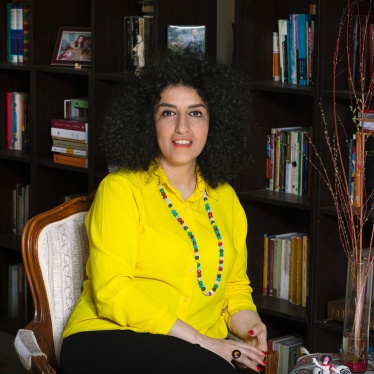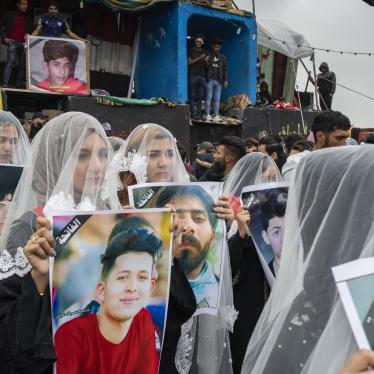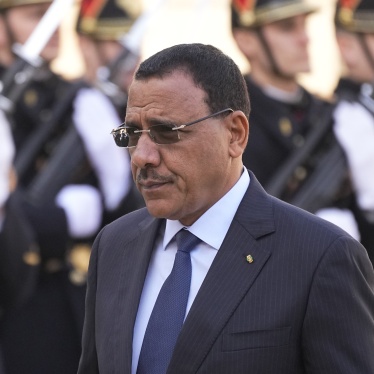(Nouakchott) – Mauritania’s human rights defenders face repression when they raise the country’s most sensitive social issues, Human Rights Watch said in a report released today. The issues include ethnic and caste discrimination, slavery, and the need for accountability for a campaign of atrocities against certain groups three decades ago.
The 73-page page report, “Ethnicity, Discrimination, and Other Red Lines: Repression of Human Rights Defenders in Mauritania,” examines the legal framework that allows the government to easily refuse legal recognition to associations it dislikes, on such grounds as engaging in “anti-national propaganda” or “exercis[ing] an unwelcome influence on the minds of the people.” Without legal recognition, associations are hard-pressed to rent a hall for a meeting or public event, obtain permission to peacefully protest, or obtain funding from foreign donors.
“Authorities tolerate a measure of human rights activism,” said Sarah Leah Whitson, Middle East and North Africa director at Human Rights Watch. “But the more activists try to address the country’s most pressing social issues, the more they seem to face prohibitions, prosecutions, and obstacles designed to hobble their work.”
The most disturbing current examples include an apostasy case against a blogger, Mohamed Cheikh Ould Mkhaitir, who until recently faced the death penalty because he criticized the use of religion to justify discrimination. In another case, Abdallahi Saleck and Moussa Bilal Biram, activists in an anti-slavery group, are serving two years in a remote prison after an unfair trial.
Mauritania’s ethnic diversity reflects the country’s location, bridging the Maghreb and West Africa. The population consists of three main ethnic groups. The first two, which together form about 70 percent of the population, speak the local dialect of Arabic known as Hassaniya. One of these groups, Beidans, are descended from Arabs and Berbers. The other, larger group is the Haratines, mostly darker-skinned former slaves and their descendants. The third group, Afro-Mauritanians, includes several ethnic groups whose native languages are African. Nearly all Mauritanians identify as Muslim.
From 1989 to 1991, during heightened tensions with Senegal to the south, authorities opened a campaign of summary executions, expulsions to Senegal, and land expropriations that targeted Afro-Mauritanians. The government of the day provided a blanket amnesty in 1993 to those responsible for the abuses. But today’s government maintains that it has provided compensation and acknowledgment to the victims and their survivors, and that this page in Mauritania’s history must now be turned.
Activists who reject the amnesty and persist in demanding more reparations, truth-telling, and accountability face sporadic repression. A retired colonel, Oumar Ould Beibacar, has been under a criminal investigation for two years because he publicly supported prosecuting those responsible for executing scores of his fellow officers a quarter century ago.
Mauritania abolished slavery only in 1981, and first criminalized it in 2007. The government claims that the challenge today is to remedy the vestiges of slavery, since slavery itself has been eradicated. Activists state that slavery is still practiced, though reliable data does not exist and there is disagreement on its extent.
The most outspoken anti-slavery group, the Initiative for the Resurgence of the Abolitionist Movement (IRA), is a particular target of the authorities. In addition to Saleck and Biram, who were convicted of incitement for an unarmed gathering and administering an “unrecognized” association, eight other members received lesser sentences in the same trial. In an earlier case, the group’s president and then vice-president spent 18 months in prison on trumped-up charges relating to a stand-off with police in 2014 over an awareness-raising “caravan” that IRA had co-sponsored.
Mauritania has taken steps to show a commitment to the international human rights system. It has ratified most major human rights treaties, adopted domestic laws to protect human rights, and engaged with the United Nations and African human rights systems. It has provided frequent, though not unfettered, access for international rights groups. Human Rights Watch visited twice in 2017 without obstacles; officials met with the delegation, permitted visits to prisons, and provided a written response to questions, which is included in the report.
But the authorities undermine these positive steps by their repression of local activists. The whereabouts of Mkhaitir, the blogger, are unknown. Although the appeals court verdict in November should have led to his release, he has not been seen or heard from since, and authorities have said nothing publicly about his whereabouts.
The Mauritanian authorities should void Mkhaitir’s conviction, immediately release him unconditionally, and repeal the provision of the penal code’s article 306 criminalizing apostasy and punishing it with death. The activists Saleck and Biram should also be freed and given a new and fair trial if there is evidence to warrant it.
The government should limit the authority of the executive branch to dissolve or refuse to register groups; amend the draft associations law to eliminate the registration requirement or make it easier to register; allow any peaceful group to register; and allow public gatherings without prior permission unless there is a demonstrable risk to national security or public order.
“Authorities point to the thousands of legalized independent associations in Mauritania as proof that civil society is flourishing,” Whitson said. “But the real proof is to be found in how the government treats the tiny minority of associations that aggressively raise difficult questions.”











